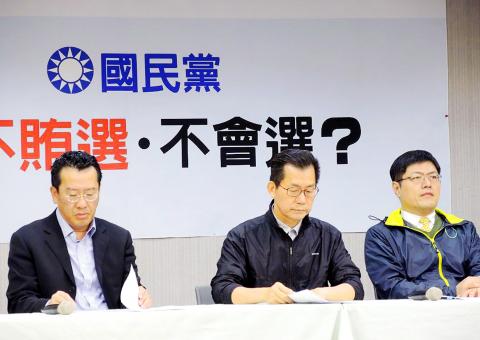The Democratic Progressive Party (DPP) yesterday accused the Chinese Nationalist Party (KMT) of involvement in nationwide vote-buying activities for the Jan. 16 presidential and legislative elections, warning that it might file lawsuits after the elections.
“Election day is only 13 days away, and people around the nation have been tipping off [the DPP] about vote-buying activities, especially in Chiayi County, where vote-buying is committed almost publicly,” DPP spokesperson Yang Chia-liang (楊家俍) told a news conference at the DPP’s headquarters in Taipei.
“KMT Chairman Eric Chu (朱立倫) has repeatedly claimed that he will reform the KMT, but not only has the party assets issue not been resolved, vote-buying is still taking place,” Yang said.

Photo: CNA
The DPP recently received information about a banquet for more than 10,000 people hosted by the KMT’s Hsinchu City Council caucus and an alleged cash-for-votes scheme in Chiayi, said Lien Li-jen (連立堅), executive director of a DPP task force to combat election irregularities, who added that the Changhua County Prosecutors’ Office has launched an investigation into a free tour for voters in Fenyuan Township (芬園) allegedly organized by independent legislative candidate Hsu Yung-chin (許永金).
Lien said that he also suspects the judiciary has been giving vote-buying suspects affiliated with the KMT favorable treatment.
“In the Changhua case, the 400 people who went on the excursion were all questioned and the primary suspect was detained. However, information about the Hsinchu banquet was sent to prosecutors prior to the event, but they did not make a move until images from the event were made public,” Lien said.
In the Chiayi case, Lien said that even though “there were serious charges and cash was found, the suspects were released on bail.”
The Ministry of Justice’s Investigation Bureau busted a case in the county’s Shueishang Township (水上), where two individuals, surnamed Huang (黃) and Lin (林), were suspected of distributing between NT$500 and NT$1,000 per vote to people. Huang was found carrying NT$25,000 in cash, and was quoted by the police as admitting to being involved in vote-buying, while three people were quoted by police as admitting to selling their votes.
However, the Chiayi District Court rejected a request by prosecutors to detain Huang, citing insufficient evidence.
Attorney and DPP legislator-at-large candidate Wellington Koo (顧立雄) said the DPP would continue to collect information on election irregularities, adding that if it finds solid evidence of the KMT’s involvement in vote-buying, it would file lawsuits to revoke elections within 30 days of the Jan. 16 elections.

MAKING WAVES: China’s maritime militia could become a nontraditional threat in war, clogging up shipping lanes to prevent US or Japanese intervention, a report said About 1,900 Chinese ships flying flags of convenience and fishing vessels that participated in China’s military exercises around Taiwan last month and in January have been listed for monitoring, Coast Guard Administration (CGA) Deputy Director-General Hsieh Ching-chin (謝慶欽) said yesterday. Following amendments to the Commercial Port Act (商港法) and the Law of Ships (船舶法) last month, the CGA can designate possible berthing areas or deny ports of call for vessels suspected of loitering around areas where undersea cables can be accessed, Oceans Affairs Council Minister Kuan Bi-ling (管碧玲) said. The list of suspected ships, originally 300, had risen to about 1,900 as

Right-wing political scientist Laura Fernandez on Sunday won Costa Rica’s presidential election by a landslide, after promising to crack down on rising violence linked to the cocaine trade. Fernandez’s nearest rival, economist Alvaro Ramos, conceded defeat as results showed the ruling party far exceeding the threshold of 40 percent needed to avoid a runoff. With 94 percent of polling stations counted, the political heir of outgoing Costa Rican President Rodrigo Chaves had captured 48.3 percent of the vote compared with Ramos’ 33.4 percent, the Supreme Electoral Tribunal said. As soon as the first results were announced, members of Fernandez’s Sovereign People’s Party

MORE RESPONSIBILITY: Draftees would be expected to fight alongside professional soldiers, likely requiring the transformation of some training brigades into combat units The armed forces are to start incorporating new conscripts into combined arms brigades this year to enhance combat readiness, the Executive Yuan’s latest policy report said. The new policy would affect Taiwanese men entering the military for their compulsory service, which was extended to one year under reforms by then-president Tsai Ing-wen (蔡英文) in 2022. The conscripts would be trained to operate machine guns, uncrewed aerial vehicles, anti-tank guided missile launchers and Stinger air defense systems, the report said, adding that the basic training would be lengthened to eight weeks. After basic training, conscripts would be sorted into infantry battalions that would take

GROWING AMBITIONS: The scale and tempo of the operations show that the Strait has become the core theater for China to expand its security interests, the report said Chinese military aircraft incursions around Taiwan have surged nearly 15-fold over the past five years, according to a report released yesterday by the Democratic Progressive Party’s (DPP) Department of China Affairs. Sorties in the Taiwan Strait were previously irregular, totaling 380 in 2020, but have since evolved into routine operations, the report showed. “This demonstrates that the Taiwan Strait has become both the starting point and testing ground for Beijing’s expansionist ambitions,” it said. Driven by military expansionism, China is systematically pursuing actions aimed at altering the regional “status quo,” the department said, adding that Taiwan represents the most critical link in China’s